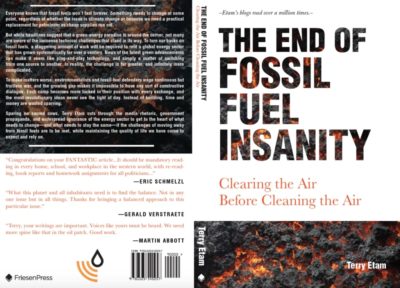Are you familiar with Sam Bankman-Fried, the crypto-whiz kid that started crypto-exchange FTX, the 30-year-old worth $30 billion, some were hailing as the new Warren Buffett? His empire is now a pile of rubble, and against all legal advice he’s been delightfully verbose about the epic failure. Here’s a text exchange with a reporter, grammar verbatim:

Q: you were really good at talking about ethics, for someone who saw it all as a game with winners and losers
A: ya…
A: hehe
A: I had to be
A: it’s what reputations are made of, to some extent
A: I feel bad for those who get [xxx]ed by it
A: by this dumb game we woke westerners play where we say all the right shiboleths and so everyone likes us
At least insofar as that point, he’s honest. Mr. Bankman-Fried (and a few other brave ones) have done us a giant favour by speaking out about the “dumb game”.
I, and a great many, are fed up with the stupidity in energy conversations. It is preposterous that energy is controversial. There is no need for the animosity. The energy world is interesting and complex and challenging; there is an endless inventory of things to talk about that are worth talking about because they shine light on arcane corners, and everyone benefits.
But sometimes the fruitful and constructive conversations can only happen after the witch hunt has stopped.
I’m going to dip into the madness of energy conversations just for a minute, to prove a point. Al Gore recently spoke at the WEF Davos Festival of Important People, giving his opinion about current hydrocarbon usage: “That’s what’s boiling the oceans, creating these atmospheric rivers, and the rain bombs…”
Make of that what you will. Then consider the words of Zion Lights, one of the founders of Extinction Rebellion, the UK based activist organization born to destroy fossil fuels (the group is now known as “Just Stop Oil”). Her story: “For the past 16 years, I was part of one environmental organization or another as an activist or paid employee. First it was Camp for Climate Action, where we protested a different corporation every year…in 2018 I joined Extinction Rebellion…I started out at the local level…One of the founders of XR had watched a few of my media appearances…and asked me to join the XR Media and Messaging Team…I was instructed to cry on television. ‘People need to see crying mothers,’ Jamie Kelsey-Fry, the trainer and long-time XR activist, told me…The whole thing was a masterclass in how to manipulate emotions. We were instructed to bring everything back to the climate emergency…Nothing about solutions or science.”
Despite this top-notch climate activist pedigree, Ms. Lights soon found herself in the movement’s crosshairs. She chose not to support an XR blockade of London commuter trains, because thousands of blue-collar workers would risk losing their jobs.
Ditto for XR stunts like shutting down Heathrow with drones, or XR founder Roger Hallam’s proposal to take a private jet to the us to launch XR US. She decided nuclear power was the best option to reduce emissions.
As a result, Ms. Lights left the organization, and was, unbelievably, instantly labeled as a climate denier in an XR statement, and XR advised the media not to talk to her.
Climate denier. Really. She writes in the New Statesman, “no cost is too high to tackle the climate emergency and prevent the millions of deaths that occur every year due to air pollution from fossil fuels.” Wow, the climate denier tag has some considerable flexibility.
Al Gore can make any outrageous claim he likes, and fly in as many private jets as he likes, because he says the right shiboleths. Zion Lights is branded on the forehead as a climate denier because she dared say something different.
A word about credibility: please consider Ms. Light’s quote and where you’re reading it, right now. I disagree vehemently with Ms. Lights’ take on fossil fuels if only because they currently keep 8 billion people alive. Nevertheless, I have no interest in trying to shout her down or ridicule her, because she shows a level of common sense that the likes of Gore or this next fellow coming up can’t hope to match.
Energy discussions have become polarized and toxic because the same laws of the jungle are happening. Half the hydrocarbon sector is working on energy transition initiatives – carbon capture, solar installations, methane reduction, geothermal, lithium, RNG, you name it – and by and large does not stand in the way of wind and solar or anything else.
But the opponents of the sector have no plans or interest in meeting in the middle. They act like Extinction Rebellion. In fact, they outright say they act like Extinction Rebellion.
Think that’s hyperbole? Listen to this guy – Canada’s climate minister, Steven Guilbeault, whose career extruded from the bowels of Greenpeace. In a New York Times interview, Mr. Guilbeault shared a few thoughts about his ascendency to power and his views on activists like Just Stop Oil (Interviewer: “How do you understand the climate protests happening how, like activists throwing mashed potatoes at a Monet, others that flung tomato soup at works of art?” Guilbeault: “I think activism is essential and is important. And I often — not that they need reminding, but I tell my ex colleague [sic] that it’s not a bad thing that they keep my feet to the fire, that they keep the pressure on…overall, I think activism and protest are essential.”).
When I heard that a Greenpeace activist had made it into the highest levels of politics, I was gruesomely impressed – those activists are good. Now that’s some long-range strategic planning.
But the activists didn’t have to scheme to get someone into the inner circle – Greenpeace (via Guilbeault) was invited. And the criminal antics of Guilbeault and Just Stop Oil weren’t glossed over or buried or hidden, they were flaunted and admired.
Proof: Guilbeault, from the NYT article again: “…the prime minister [Trudeau] asked me if I would run in the 2019 election. I must say, it took me a long time to decide…” Once he had decided, and found himself elected, Guilbeault recounts a telling incident: “The prime minister turns to me, and he says, Steven, have you ever met President Biden? Of course I’ve never met President Biden. So the prime minister grabs me. And as your president is about to leave the room with his 10 bodyguards and everything, my prime minister just grabs him by the shoulder and he says, Joe, let me introduce you to my new environment minister. He’s a real activist. He was arrested four times for his climate change activism.”
His brazenness is almost unbelievable. Guilbeault remains firmly dedicated not to governance but to his extremist past: “I see my role, and I think certainly the prime minister of Canada sees my role as being an activist inside government as opposed to what I used to do, being an activist outside government. So in some ways, the work I do hasn’t changed so much.”
Gore’s statement was made at WEF/Davos, a pretty big stage. Guilbeault’s interview was in the New York Times, another huge platform. Zion Lights’ story was published on media renegade Bari Weiss’ site “The Free Press” and was picked up by none of the big media outlets. The machine ate her alive.
So therefore imagine defending hydrocarbon benefits in public; it’s like running through a lion cage with a pork chop necklace. The problem is now caricature – the rapidly growing ChatGPT AI tool is programmed to refuse to say anything positive about fossil fuels. Catastrophizing about potential climate problems is an unchecked free-for-all; saying natural gas saves lives is, in many circles, unacceptable.
To be clear: deranged nonsense is a familiar brew across the political spectrum. I am pretty sure Hilary Clinton isn’t running a pedophile ring out of a pizza shop, and covid vaccines didn’t turn me into a 5G hotspot.
So this discussion is not a political diatribe; there is not a left/right split involved, not since the left abandoned the working class and the right started objecting to standing up to Russia (very weird times). But there are axes upon which these dialogues should be framed.
The first axis is class distinction. Extremism as catalogued above is the worry of the rich, the jet-setters, the laptop class. Bill Gates recently stated in a blog that “more people around the world see climate as a major threat than any other issue”, referencing a Pew survey.
The survey, however, only asked 19 rich and/or westernized countries, representing a fraction of the world’s population (though much of its wealth). All you poor bumpkins, we’ll tell you what you need to worry about.
The second axis is constructive vs destructive. Do we want to build things, or tear things down? How does anyone envision a successful energy transition to occur when the elected architects vow to bring down the bedrock industry of our times without a suitable replacement ready? (Guilbeault, yet again: “when you look at the history of the environmental movement, it was really created around being an opposition to something… we have organizations that are more solutions-oriented and not so much in opposition to things. But there are still things we should be opposed to.”).
Ms. Lights took the high road, even if she takes a swipe at hydrocarbons – she realized the faulty premises of the activist movement and concluded that nuclear is the best path forward. (Even her framing of hydrocarbons has credibility even if it is resoundingly one-sided; it is true that pollution arises from hydrocarbon consumption, but any worthwhile analysis has to compare the benefits they bring as well.)
Voters, this is up to you. Don’t vote in wingnuts that paint Hilary as a pedophile or that want to overthrow governments. But equally important is to avoid voting for those that will not stand up to the energy insanity being forced on us by avowed extremists.
Our current energy system developed over a century. You may not like it but remember the inescapable trajectory. Out current world order has been significantly shaped by the demand for hydrocarbons. Or more precisely, the demand for hydrocarbon access.
That remains so to this day. Germany and Japan recently came to Canada in search of natural gas supplies. We sent them away with lectures. Poor nations don’t even bother to ask us, even though they need LNG as much or more than Germany and Japan; they must turn to coal or wood or worse for fuel.
And stop with the “the energy transition is happening rapidly” nonsense:
In 2012, installed wind power capacity was 267 GW. By 2021, there was 825.
In 2012 global renewable energy generation was 1, 067.8 Terawatt-hours. In 2021, it was 3,657.
In 2012, global oil consumption was 89 million barrels of oil per day. In 2021, it was 94 million, slowed dramatically by Covid restrictions. By 2024, it is expected to be 102 million.
In 2012, global natural gas consumption was 3,319 billion cubic metres (bcm). In 2021, it was 4,038. By 2024, it is expected to be 4,300.
In 2012, global coal consumption was 159 exajoules. In 2021, it was 160. I don’t have an exajoules forecast, but demand is expected to rise through 2025 setting new all-time consumption records.
How’s that for an energy transition?
It’s not. It’s an ever-growing energy consumption pie made up of different components.
It is absolutely true that new energy technologies are being pursued vigorously and will play a bigger and bigger role. Thousands of new enterprises are working on new energy solutions – everything from hydrogen to batteries to molten salt to cadmium tellurium solar cells to RNG to CCS to CCUS to DAC to pyrolysis to nuclear fusion to countless garages in search of energy’s holy grail.
But there is no silver bullet. There are countless ideas being pursued; some will succeed, but none will take over rapidly. This isn’t the same as cell phones replacing land lines, because the leap forward in functionality was off the charts and unimaginable.
It’s not like the development of autos over horses, because that change was cataclysmic as well, in a way that opened new worlds for people and commerce and travel. Nothing in the energy transition is shaping up that way, unless widespread small nuclear reactors or something wilder takes over.
No one should pretend an energy transition is inevitable just because we declare we want it to be. The world doesn’t work that way. And it empowers a group of dedicated but uninformed enthusiasts to create disastrous energy policy.
We have as a society placed at the forefront these people that want to destroy the fuel system, and they will tolerate no dissent (just ask Ms. Lights). It is hard to talk about the quality of the roses when the barbarians are at the gate.
Starving the industry of capital and people limits output, but while global consumption continues to rise, the end result will be price spikes and much higher utility bills. The poor will pay dearly.
Understand that that is the sequence of events – high oil/gas profits are the result of restrictive and antagonistic policy against producers. The more they are attacked, the higher your bills will go. The equation is simple.
Our fuel system is at stake. Our ability to heat homes is at stake. Vital industries in developing countries are at stake. You may not know if you can get by with 2 degrees warmer temperature in 50 years, but I guarantee you won’t get by in the next 5 years without a healthy hydrocarbon sector.
Vote wisely.
Energy dialogue should be exciting and positive! Get started by deconstructing the current mess. Pick up “The End of Fossil Fuel Insanity” at Amazon.ca, Indigo.ca, or Amazon.com. Thanks!
Read more insightful analysis from Terry Etam here, or email Terry here.




